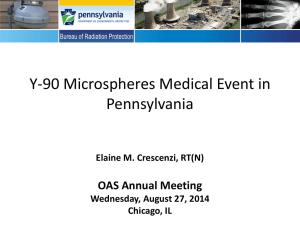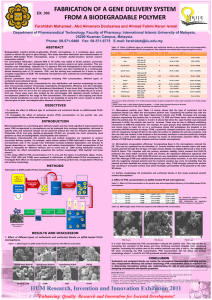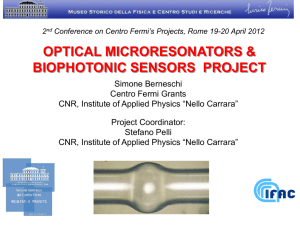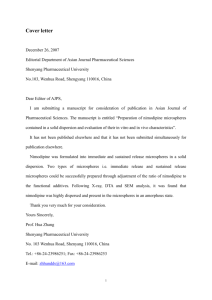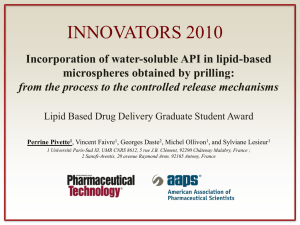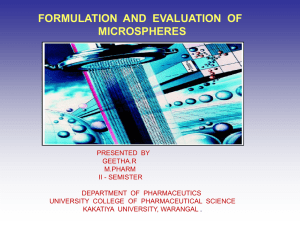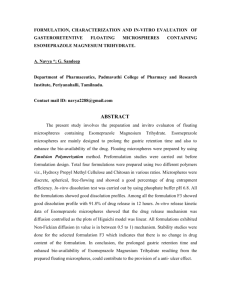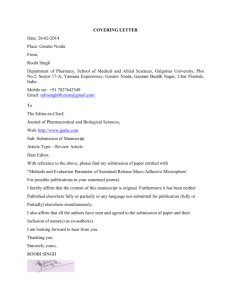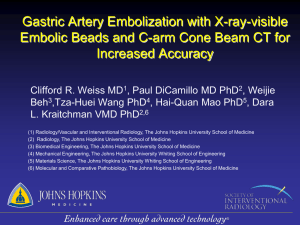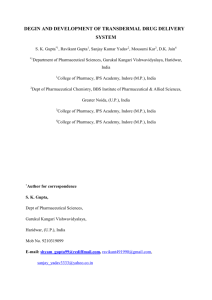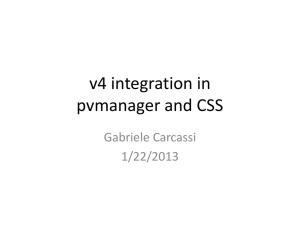Embolic Agent Variables
advertisement
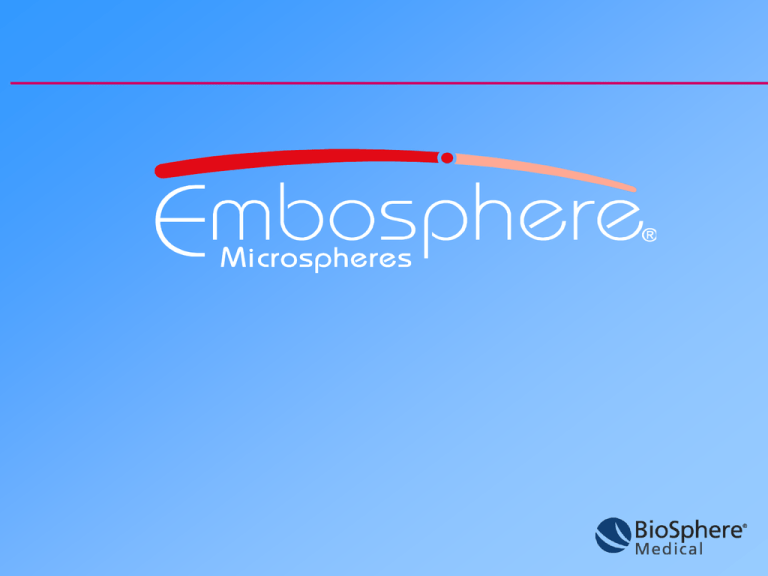
History of Embolotherapy 1904 Dawbain - inject melted wax/carotid 1930 Brooks - inject muscle/int. carotid 1960 Lussenhop & Spence - MM spheres 1971 PVA Plug 1972 Hemorrhage controlled auto-clot 1974 Serbinenko -Detachable balloons History of Embolotherapy White et. al. - flow directed cath w/det. Bal. 1974 Gel Foam 1975 Wool Coil 1981 Ethanol used kidney infarction 1982 Amplatz - boiled contrast Improvements in Visualization, Catheter Technology, Embolic Agents Embolic Agent Variables Delivery Mechanical Effort Tortuousity of Vessels Procedure Time - Radiation, Contrast Placement Flow directed Proximal or distal In-vivo sizing Reflux tendency Embolic Agent Variables Radiopacity Additives tantulum, barium, et. al. MRI Compatibility Activation Toxicity Expansion Necrosis Embolic Agent Variables Sizing Inflammatory Response Local mild or giant cell reaction Pain on Administration Ranges and tolerance Alcohol, gelfoam, PVA Permanent or Temporary Auto-lysis Recanalization Vessels recanalize Embolic can “wash-out” Vessel with embolic can remodel Not important in pre-op embos Timing is the key variable Embolic Agent Variables Cost Occlusion Mechanism Total procedure cost and patient life Mechanical Thrombus Hemodynamics Large vs. small vessels High flow or slower flow Particles Irregular shape Induce an inflammatory response Auto-lysis Some are temporary Occlusion sustainability Thrombogenic May be difficult to handle Mechanical Devices Coils Thrombogenic Size and delivery Permanent Balloons Latex or silicone Mechanical occlusion Liquid Embols Ethanol and Ethibloc are painful Results can take time post procedure Can be difficult to handle Obliteration, permanent Extensive necrosis possible Glues Acrylates used but not approved Polymerize upon contact with ionic solutions Some use Acetic acid or heavy water to delay High inflammatory response Permanent Experience is critical Difficult to handle Embolic Agents Sclerosant Spheres Particles Mechanical Liquid Embosphere PVA Coils NBCA Therasphere Gelfoam Balloons Hydrogel Acetic acid Ethanol Hepasphere Sotradecol Contour SE Ethibloc Beadblock Spheres Calibrated Radio-pacity Flow directed Carrier Dry or wet Polymer, hydrogel, glass Mechanical occlusion Company History Microspheres developed to purify Human Serum Albumin and antibodies -1970s IBF-French Biological Industries and later Biosepra produce microspheres for drug purification - 1980s Microspheres used to produce albumin, insulin, and genetically engineered human growth hormone - 1980s Company History First use of microsphere as a human implant at LRB in Paris, 1989 Early 1990s: Microspheres used to produce biotech drugs such as TPA, AT3, gene therapy vaccines Sepracor purchases Biosepra Company History Biosepra spins off from Sepracor, 1994 Biosepra, through its French distributor, obtains CE Mark for Embosphere, 1997 Biosepra sells chromatography business, 1998 Biosepra purchases majority share of Biosphere Medical SA and changes corporate name to Biosphere Medical, 1999 BSMD files 510k, 1999 Company History Management team nucleus hired, 1999 IDE filed for UAE clinicals, 1999 European distribution expanded, 1999 Australia and Canada approve Embosphere, 2000 PIPEs completed, 2000 FDA clearance for Embosphere, 2000 Sales force recruited, 2000 Embosphere® Microspheres are precisely calibrated, spherical, hydrophilic, micro-porous beads made of a cross-linked acrylic co-polymer which is then cross-linked with gelatin. • Cross-linked acrylic beads • Precisely calibrated • Micro-porous • Embedded with gelatin • Compliant • Hydrophilic • Non-clumping • Patented and proprietary Embosphere PVA • Spherical • Non Aggregating • Uniform occlusion • Predictable penetration • Irregular shape • Clumping • Non-uniform occlusion • More proximal occlusion A Precise Calibration % (volume) 50-150 microns % Volume Ultra-Drivalon 50-150m Ultra-drivalon – Nycomed 50-150 PVA type 1 m 30 20 10 0 1 10 100 Particle diameter (m) 1000 1 10 100 Particle diameter (m) 1000 1 10 100 Particle diameter (m) 1000 - TargetContour Emboli 45-150m % Volume Contour emboli PVA type 2 50-150 m 50-150 microns % (volume) 30 20 10 0 30 % (volume) % Volume Embosphere Microspheres - Medical EMBOSPHERE - Biosphere Microspheres 100-300m 100-300 m Biosphere Medical 100-300 microns 20 10 0 A Precise calibration The only particulate embolic material you can trust ! Competitive Advantage Vessel diameter (µ) “Controlled Vessel Targeting” 600 500 400 300 200 100 0 800 700 600 500 400 300 200 100 0 Embolization efficiency Number of particles 22.5 20 17.5 15 12.5 10 7.5 5 2.5 0 Embosphere PVA Perfectly spherical A direct correlation between the size of the vessels and the size of embolic ! Inert biocompatible material Cross-linked acrylic bead impregnated with gelatin Acute and chronic animal testing 6 year implant Chromatography media Cell-culturing history Strong safety profile Six year implant Complete mechanical occlusion Inert material Remains unchanged over time PVA Degradation Non-uniform occlusion Chronic inflammatory response Histology slides courtesy of Dr. Alex Laurent, Hopital Lariboisiere, Paris Long-term tolerance - Facial AVM Female patient. 25 yrs. 1989 sept Embolization with ES 500-700 & 700-900 1990 march Surgery 6M 1990 oct Surgery 1Y 1993 feb Surgery 1995 oct Surgery 6Y 6 years 1 year 6 years Long term tolerance Facial AVM Male patient, 31 yo, lip AVM 1988 Embolization PVA 1990 dec Embolization ES 800-1000 1992 nov Surgery (23 M) 23 Months * PVA particle ES ES * ES * 23 Months * = Macrophages Biocompatibility Permanent Durable Complete Mechanical Occlusion Compressible and Hydrophilic Elastic shape and hydrophilic surface prevent aggregation within the catheter, simplifying handling and promoting accurate delivery to the target vessel. Compressible and Hydrophilic Assume 33% compression gets back in round shape Embosphere and 3F Catheters Brand I.D. Micro Ferret .018 Embosphere size in m 300-500 Rapid Transit .021 500-700 Turbo Tracker .021 500-700 Renegade .021 500-700 GT Leggiero .023 500-700 Tracker 325 .024 700-900 Slip Cath .025 700-900 SP Cath .025 700-900 Mass Transit .027 700-900 Trademarks and product names are exclusive properties of their manufacturers. Here above information is purely given as indications. Compressible and Hydrophilic A unique ease of use A superior catheter patency Summary of Competitive Advantages Embosphere (ES) PVA Spherical shape, Narrow size range Irregular shape, Targeted and wide range of sizes controlled Complete, permanent occlusion Elastic structure Non-elastic structure Microcatheters Non-fragmentation Minimizes untargeted tissue necrosis Hydrophilic/ Charged surface Non-hydrophilic/ Non-charged No clumping Ease of use No migration ES Advantage Key Features & Benefits Features Benefits Round Calibrated Inert Compressible Hydrophilic Complete lumen filling Control and targeting Biocompatible Catheter patency Easy to inject Platform technology The proven embolic Embosphere® microspheres: First generation of calibrated microspheres The new Gold Standard EmboGold™ microspheres: User-friendly stained calibrated microspheres Embosphere® microspheres From right to left 40-120µm 100-300µm 300-500µm 500-700µm 700-900µm 900-1200µm Embosphere® microspheres Calibrated microspheres available in 1ml or 2ml sizes Product codes 40-120µm 100-300µm 300-500µm 500-700µm 700-900µm 900-1200µm 110GH 210GH 410GH 610GH 810GH 1010GH 120GH 220GH 420GH 620GH 820GH 1020GH EmboGold™ microspheres New pre-filled syringe under peel-off blister tray Calibrated microspheres Stained with Gold 100-300µm 300-500µm 500-700µm 700-900µm 900-1200µm EmboGold™ microspheres Visibility Convenience Performance Stained calibrated microspheres available in PFS 1ml or 2ml sizes Product codes 100-300µm 300-500µm 500-700µm 700-900µm 900-1200µm S210EG S410EG S610EG S810EG S1010EG S220EG S420EG S620EG S820EG S1020EG
